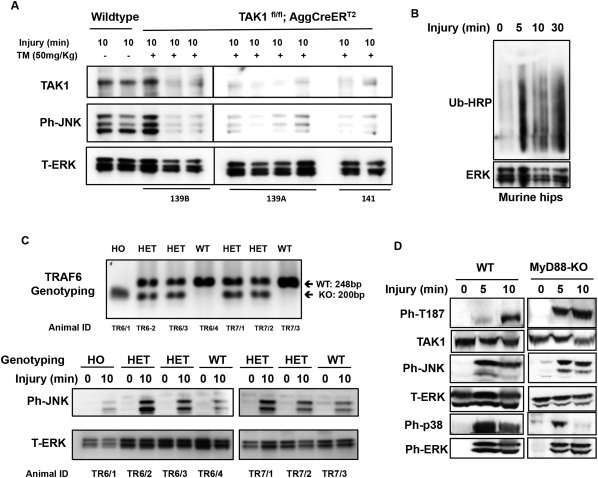Figure 6.

Injury‐induced signaling in avulsed murine epiphyses involves transforming growth factor β–activated kinase 1 (TAK‐1) and is retained in TRAF‐6–null and MyD88‐null mice. A, Cre recombination–mediated cartilage‐specific TAK‐1 deletion was induced by tamoxifen (TM; 50 mg/kg) as described in Materials and Methods. Murine proximal femoral epiphyses (2 hips per time point) were avulsed and either snap‐frozen (time point 0 minutes) or cultured for the indicated times in serum‐free medium. Cartilage lysates were analyzed by Western blotting for TAK‐1, phospho‐JNK (ph‐JNK), and total ERK (T‐ERK; loading control). B, Murine femoral epiphyses were avulsed, and lysates were analyzed by Western blotting for ubiquitinated proteins and ERK. Ub‐HRP = horseradish peroxidase–conjugated ubiquitin. C, TRAF‐6–null mice were generated as described in Materials and Methods. Top, DNA was extracted from the tips of the tails of 6‐day‐old animals for TRAF‐6 genotyping polymerase chain reaction. Bottom, Murine femoral epiphyses (1 hip per time point) were avulsed, and lysates were analyzed by Western blotting for phosphorylated JNK and total ERK (loading control). D, Murine femoral epiphyses from MyD88‐null mice were avulsed, and lysates were analyzed by Western blotting for phospho–TAK‐1, TAK‐1, phospho‐JNK, total ERK, phospho‐p38, and phospho‐ERK. HO = homozygous; HET = heterozygous; WT = wild‐type; KO = knockout.
